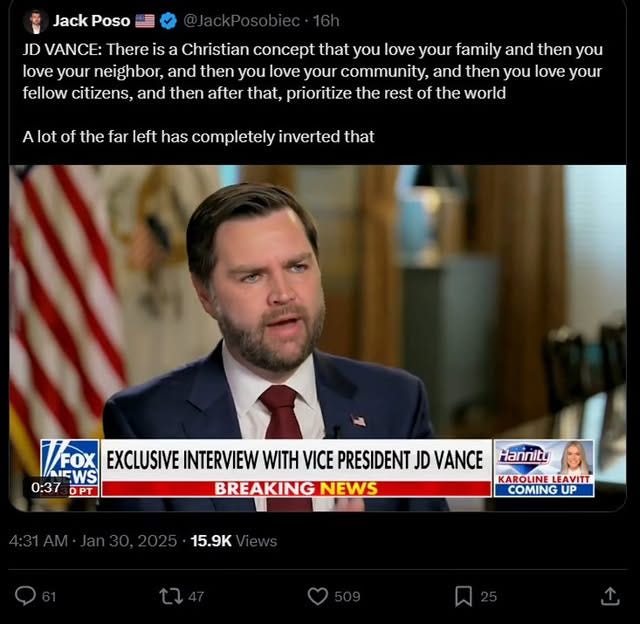The Gospel of Love vs. the Idolatry of Nation
How Christian Nationalism Distorts Jesus’ Call to Love Without Borders
The Gospel of Love vs. the Idolatry of Nation: How Christian Nationalism Distorts Jesus’ Call to Love Without Borders
Jesus had been approached by the chief priests, scribes, and elders and was being questioned by the group. “By what authority are you doing these things? Who gave you this authority to do them?”[i] After that round of questioning, a group of Pharisees and Herodians came to Him and tried to trap Him with a series of questions relating to taxes. This is where we get the line, “Give to the emperor the things that are the emperor’s, and to God the things that are God’s.”[ii] Finally, a group of Sadducees approached Jesus to question Him about the resurrection.
After these challenges, a lone scribe, perhaps one who had been watching from a safe distance, approached Jesus and presented Him with a final question: “Which commandment is first of all?” The scribe is asking, which commandment is the greatest? Of the 613 mitzvot—the commandments in the Torah—which one is the most important?
Jesus does not answer the question in the way it was asked. Instead of offering just one commandment, He gives the scribe more than he requested:
“The first is, ‘Hear, O Israel: the Lord our God, the Lord is one; you shall love the Lord your God with all your heart, and with all your soul, and with all your mind, and with all your strength.’ The second is this, ‘You shall love your neighbor as yourself.’ There is no other commandment greater than these.”[iii]
Jesus is clear: love of God and love of neighbor are inseparable. True faith is not about public acts of piety, national identity, or political power. It is about radical, self-giving love—love that is not limited by borders, race, or economic status.
Christian Nationalism vs. the Gospel
Vice President Vance’s comments are the latest example of Christian nationalism twisting the gospel to serve political ends at the expense of the very people Jesus spent His time with. Vance argues that we should prioritize love in a hierarchy—family first, then community, then nation, and only after that, the rest of the world. This is not the gospel. This is not what Jesus taught.
Christian nationalism has always been an attempt to reshape Jesus into a tribal figure, one who blesses our nation over others, who prioritizes "our own" instead of calling us to love sacrificially. But Jesus didn’t say, “Take care of your own first.” He didn’t say, “Love your family, then your country, and only afterward concern yourself with the suffering of others.” Instead, He gave us the Parable of the Good Samaritan—a story that directly contradicts Vance’s worldview.
As Fr. James Martin SJ explains:
"After Jesus tells a lawyer that you should 'love your neighbor as yourself,' the lawyer asks him, 'And who is my neighbor?' In response, Jesus tells the story of a Jewish man who has been beaten by robbers and is lying by the side of the road. The man is helped not by those closest to him (a 'priest' and a 'Levite'), but rather by a Samaritan. At the time, Jews and Samaritans would have considered one another enemies."
Jesus’ fundamental message is that everyone is our neighbor. It is not about helping just our family or those closest to us—it is specifically about helping those who seem different, foreign, or other. They, too, are our neighbors.
And let’s be clear: Vance’s words are not just about some abstract principle of ordering love. They are part of a deliberate attempt to dehumanize immigrants, to justify the cruelty that the Trump administration is preparing to unleash on migrants seeking safety and a better life. When Vance speaks of putting Americans first, he is setting the stage for policies that treat the foreigner not as a neighbor to be loved, but as a threat to be expelled. This rhetoric serves as moral cover for mass deportations, for the breaking apart of families, for children torn from their parents and sent to detention centers.
But Jesus spent His time with the outcast. He healed the sick, touched lepers, ate with tax collectors, and lifted up the poor. The law He called the greatest—love God, love neighbor—does not make room for the kind of exclusion Vance preaches. The gospel does not tell us to turn away the refugee, the immigrant, the stranger at our door.
In fact, Jesus was often critical of those who would put family first. Fr. Martin reminds us that when Jesus' own family came from Nazareth to Capernaum to “seize” Him, He was told that His mother and brothers were waiting outside the house where He was preaching. Jesus replied:
"Who is my mother, and who are my brothers? … Whoever does the will of my Father in heaven is my brother and sister and mother”[iv]
For Jesus, ties to the Father were more important than family ties. And responsibilities to family clearly took second place to the demands of discipleship.
What Loving Your Neighbor Really Means
Loving our neighbor, as Jesus commanded, is not about who is closest to us in proximity or blood. It is about seeing the image of God in every person and acting accordingly. It means that when we see suffering, we respond—not just when it is convenient or politically advantageous, but because love requires it.
The Torah makes clear what this love looks like: “When you reap the harvest of your land, you shall not reap to the very edges of your field…you shall leave them for the poor and the alien.”[v] Justice is not just for our own people, but for the foreigner among us.
“You shall not render an unjust judgment; you shall not be partial to the poor or defer to the great: with justice you shall judge your neighbor.”[vi] Love requires fairness, not favoritism.
“You shall not take vengeance or bear a grudge against any of your people, but you shall love your neighbor as yourself.”[vii] Love does not seek retribution, but restoration.
This is the love Christ calls us to—one that reaches beyond borders, beyond comfort, beyond self-interest.
The Example of Christ
Throughout His ministry, Jesus showed us what it means to love our neighbors: with a woman at a well, with a woman who had been hemorrhaging blood for twelve years, with a hungry crowd of people, with His closest friends around a table sharing bread and wine, and ultimately, on the cross.
And as Fr. Martin points out, the deeper meaning of the Good Samaritan story can only be understood from the perspective of the beaten man. "Our ultimate salvation depends, as it did for that man, upon those whom we often consider to be the 'stranger.'"
Before we ever attempt to fulfill these commandments, Christ first loved us. He fulfilled them for us. And because of that, we are called to love without boundaries, without fear, and without reservation—not as a nationalist creed, but as the very heart of the gospel itself.
[i] Mark 11:28
[ii] Mark 12:17
[iii] Mark 12:29-31
[iv] Matthew 12:46-50
[v] Leviticus 23:22
[vi] Leviticus 19:15
[vii] Leviticus 19:18







Thank you, Teer, for this wonderful analysis of the Gospel of Love vs. the idolatry of Nation! I just hope that more people of the latter persuasion could read it and believe Jesus' words to all of us.
I have been very upset at hearing so much twisting of the truth by so many in power.
You nailed it! Thank you for your testimony.